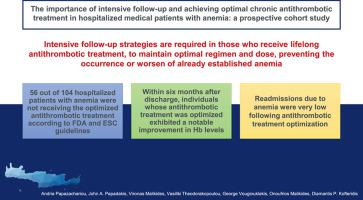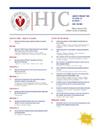The importance of intensive follow-up and achieving optimal chronic antithrombotic treatment in hospitalized medical patients with anemia: A prospective cohort study
IF 3
3区 医学
Q2 CARDIAC & CARDIOVASCULAR SYSTEMS
引用次数: 0
Abstract
Background
Anemia is a global health concern, particularly among the elderly on chronic antithrombotic treatment. Close monitoring of hemoglobin (Hb) levels and achievement of an optimized treatment significantly enhance patients’ quality of life. This study aimed to examine the impact of antithrombotic treatment on Hb levels and readmissions in hospitalized patients with anemia.
Methods
This is a prospective cohort study of patients admitted to the Department of Internal Medicine of the University Hospital of Heraklion, Greece, from November 2021 to October 2022 with the diagnosis of anemia while receiving antithrombotic treatment. Data regarding demographics, past medical history, and laboratory and endoscopy findings were recorded. For those receiving inappropriate therapy according to international guidelines, antithrombotic treatment was optimized. Subsequent follow-ups occurred at one and six months post-discharge. Six- and twelve-month anemia-caused readmissions, as well as annual mortality, were evaluated.
Results
In total, 104 patients were assessed. Among them, 34.6% were on antiplatelets, 56.7% were on anticoagulants, and 8.7% were on combination treatment. The mean age was 80 ± 8.2 years, and 54.8% were males. On admission, mean Hb levels were 6.86 ± 1.23 g/dL, while 56 (53.8%) patients had severe anemia. Gastroscopy and colonoscopy were performed in 75.0% and 41.4% of patients, respectively, confirming gastrointestinal bleeding in most of the cases. Treatment optimization was carried out for 56 patients. Follow-up revealed elevated Hb levels after one and six months post-discharge, while anemia-related readmissions stayed below 10%.
Conclusions
Most hospitalized anemic patients on antithrombotic treatment had endoscopic findings favoring gastrointestinal bleeding. Half received inappropriate antithrombotic therapy. Treatment optimization and regular follow-up improved Hb levels and reduced readmissions.


强化随访和实现最佳慢性抗血栓治疗对住院内科贫血患者的重要性:一项前瞻性队列研究
背景贫血是一个全球性的健康问题,尤其是在长期接受抗血栓治疗的老年人中。密切监测血红蛋白(Hb)水平和实现优化治疗可显著提高患者的生活质量。本研究旨在探讨抗血栓治疗对贫血住院患者血红蛋白水平和再住院率的影响。方法这是一项前瞻性队列研究,研究对象是 2021 年 11 月至 2022 年 10 月期间在希腊伊拉克利翁大学医院内科住院、诊断为贫血并正在接受抗血栓治疗的患者。记录了有关人口统计学、既往病史、实验室和内窥镜检查结果的数据。对于根据国际指南接受不适当治疗的患者,将优化抗血栓治疗。随后在出院后一个月和六个月进行了随访。结果 共有104名患者接受了评估。其中,34.6%的患者使用抗血小板药物,56.7%的患者使用抗凝药物,8.7%的患者使用联合治疗。平均年龄为(80±8.2)岁,54.8%为男性。入院时,平均血红蛋白水平为(6.86±1.23)克/分升,56 例(53.8%)患者有严重贫血。75.0%的患者接受了胃镜检查,41.4%的患者接受了结肠镜检查,大多数病例确诊为消化道出血。对 56 例患者进行了治疗优化。随访显示,出院后 1 个月和 6 个月的 Hb 水平有所升高,而与贫血相关的再住院率保持在 10% 以下。半数患者接受了不恰当的抗血栓治疗。优化治疗和定期随访提高了患者的血红蛋白水平,降低了再入院率。
本文章由计算机程序翻译,如有差异,请以英文原文为准。
求助全文
约1分钟内获得全文
求助全文
来源期刊

Hellenic Journal of Cardiology
CARDIAC & CARDIOVASCULAR SYSTEMS-
CiteScore
4.90
自引率
7.30%
发文量
86
审稿时长
56 days
期刊介绍:
The Hellenic Journal of Cardiology (International Edition, ISSN 1109-9666) is the official journal of the Hellenic Society of Cardiology and aims to publish high-quality articles on all aspects of cardiovascular medicine. A primary goal is to publish in each issue a number of original articles related to clinical and basic research. Many of these will be accompanied by invited editorial comments.
Hot topics, such as molecular cardiology, and innovative cardiac imaging and electrophysiological mapping techniques, will appear frequently in the journal in the form of invited expert articles or special reports. The Editorial Committee also attaches great importance to subjects related to continuing medical education, the implementation of guidelines and cost effectiveness in cardiology.
 求助内容:
求助内容: 应助结果提醒方式:
应助结果提醒方式:


